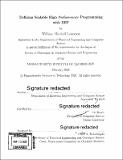Defining scalable high performance programming with DEF
Author(s)
Leiserson, William Mitchell.
Download1201306991-MIT.pdf (18.95Mb)
Other Contributors
Massachusetts Institute of Technology. Department of Electrical Engineering and Computer Science.
Advisor
Nir Shavit.
Terms of use
Metadata
Show full item recordAbstract
Performance engineering is performed in languages that are close to the machine, especially C and C++, but these languages have little native support for concurrency. We're deep into the multicore era of computer hardware, however, meaning that scalability is dependent upon concurrent data structures. Contrast this with modern systems languages, like Go, that provide support for concurrency but incur invisible, sometimes unavoidable, overheads on basic operations. Many applications, particularly in scientific computing, require something in between. In this thesis, I present DEF, a language that's close to the machine for the sake of performance engineering, but which also has features that provide support for concurrency. These features are designed with costs that don't impede code that doesn't use them, and preserve the flexibility enjoyed by C programmers in organizing memory layout and operations. DEF occupies the excluded middle between the two categories of languages and is suitable for high performance, scalable applications.
Description
Thesis: Ph. D., Massachusetts Institute of Technology, Department of Electrical Engineering and Computer Science, 2020 Cataloged from PDF of thesis. Includes bibliographical references (pages 149-156).
Date issued
2020Department
Massachusetts Institute of Technology. Department of Electrical Engineering and Computer SciencePublisher
Massachusetts Institute of Technology
Keywords
Electrical Engineering and Computer Science.